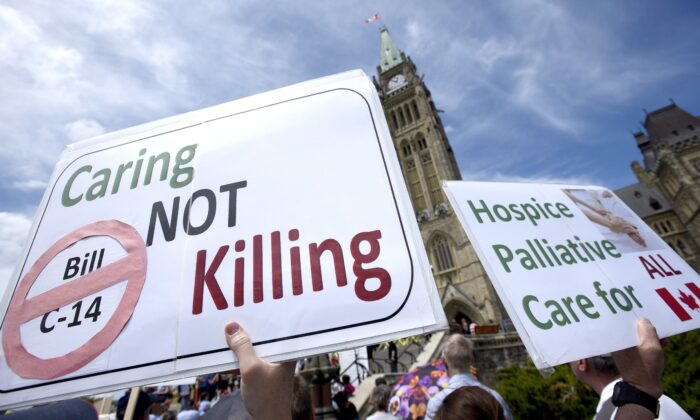China’s Factories at Risk of Double Whammy as Coronavirus Hits South Korea, Japan
News Analysis
The final week of February saw substantial announcements regarding life issues in Canada.
The federal government tabled Bill C-7 to expand the availability of euthanasia. Then, a hospice in Delta, British Columbia, was told it had to close in a year for refusing to provide medically assisted death. Next, Conservative MP Cathay Wagantall introduced a private member’s bill to ban sex-selective abortion.
Last fall, Quebec courts declared it was unconstitutional to restrict medically assisted death to those whose demise was reasonably foreseeable. Bill C-7 makes euthanasia available following a 90-day wait for anyone who has a serious and incurable illness, disease, or disability and is in an advanced state of irreversible decline in capability.
The legislation also gives a person the ability to give advance consent for euthanasia and allows a terminally ill person to receive a medically assisted death the same day they ask for it.
Living with Dignity and the Physicians’ Alliance Against Euthanasia expressed their alarm in a joint press release. “Let us be very clear: If this bill is not significantly amended, Canada will have the most permissive euthanasia program in the world.”
The groups say they were concerned euthanasia would expand from its original parameters as soon as it was legalized in 2016. Bill C-7 fulfills that prediction, and it may be expanded even further.
Although the bill says “a mental illness is not considered to be an illness, disease, or disability,” its preamble says a review in June may examine whether euthanasia is appropriate “where mental illness is the sole underlying medical condition.”
In the Netherlands, a doctor must agree that there are no other potential means of alleviating suffering before euthanizing a patient. The Physicians’ Alliance Against Euthanasia says under the proposed legislation, “There is no need for the patient to try other options; indeed, there is no need for the means to be even available to him.”
Going a step further, the B.C. provincial government and the Fraser Health Authority have prioritized the right to death over continued palliative care. The two parties cancelled their contract with the Irene Thomas Hospice in Delta because it refused to provide euthanasia.
All hospices without a religious affiliation must provide medically assisted death if half or more of their funding comes from the government. Angelina Ireland, president of the Delta Hospice Society’s board, said the hospice offered to forfeit $750,000 in annual public funding to escape that mandate.
Instead, the government announced at a press conference that the hospice would continue operation with its current government funding until Feb. 24, 2021.
“We will ensure hospice care services remain in Delta,” Health Minister Adrian Dix said. “To do that, we could restore the existing Irene Thomas Hospice site to public management. … Alternatively, we could pursue another Delta site. In either scenario, the 10 hospice beds represented by the existing facility will stay in Delta.”
Ireland said she was not told of the government’s “hostile takeover” prior to the media event.
“They have said, ‘not only do we not want to be your partner, we do not want you to be a hospice anymore. And in spite of that, you’ll now default on your lease and we’re going to take over your building,’” she said in an interview.
“Instead of being noble about the whole thing they’re basically stealing our stuff, not having to put in the work to create their own institutions,” she adds.
“And it’s all about dollars. It is easier and cheaper for the government to provide euthanasia rather than continue with palliative care.”
The hospice still has its backers. The Euthanasia Prevention Coalition (ECP) says 19,500 people signed its petition calling for the province to stop forcing hospices to provide euthanasia. The group will host a rally in support of the hospice on April 4 at the B.C. legislature.
“The battle has just begun. Hospices must not be forced to do euthanasia,” said ECP executive director Alex Schadenberg.
Cathay Wagantall, the MP for Yorkton-Melville, Saskatchewan, weighed in on a related pro-life issue by introducing Bill C-233.
“My bill would create a new penalty for a medical practitioner who knowingly performs an abortion when the reason is the sex of the pre-born child,” she said in the House of Commons on Feb. 26 during the first reading of her bill.
“Sex selective abortion is wrong, and it occurs because we have no law against it.”
A poll released Feb. 1 by DART & Maru/Blue Voice Canada showed that 84 percent of Canadians oppose sex-selective abortion and 70 percent oppose third-trimester abortions. The Supreme Court of Canada struck down the country’s abortion laws in 1988 and no legislation been enacted since.
This article is from the Internet:In Canada, New Battles Brewing on Assisted Death, Hospice Care, Abortion
Pakistan’s Largest City Shuts Schools for 2 Weeks Over Virus Fears
